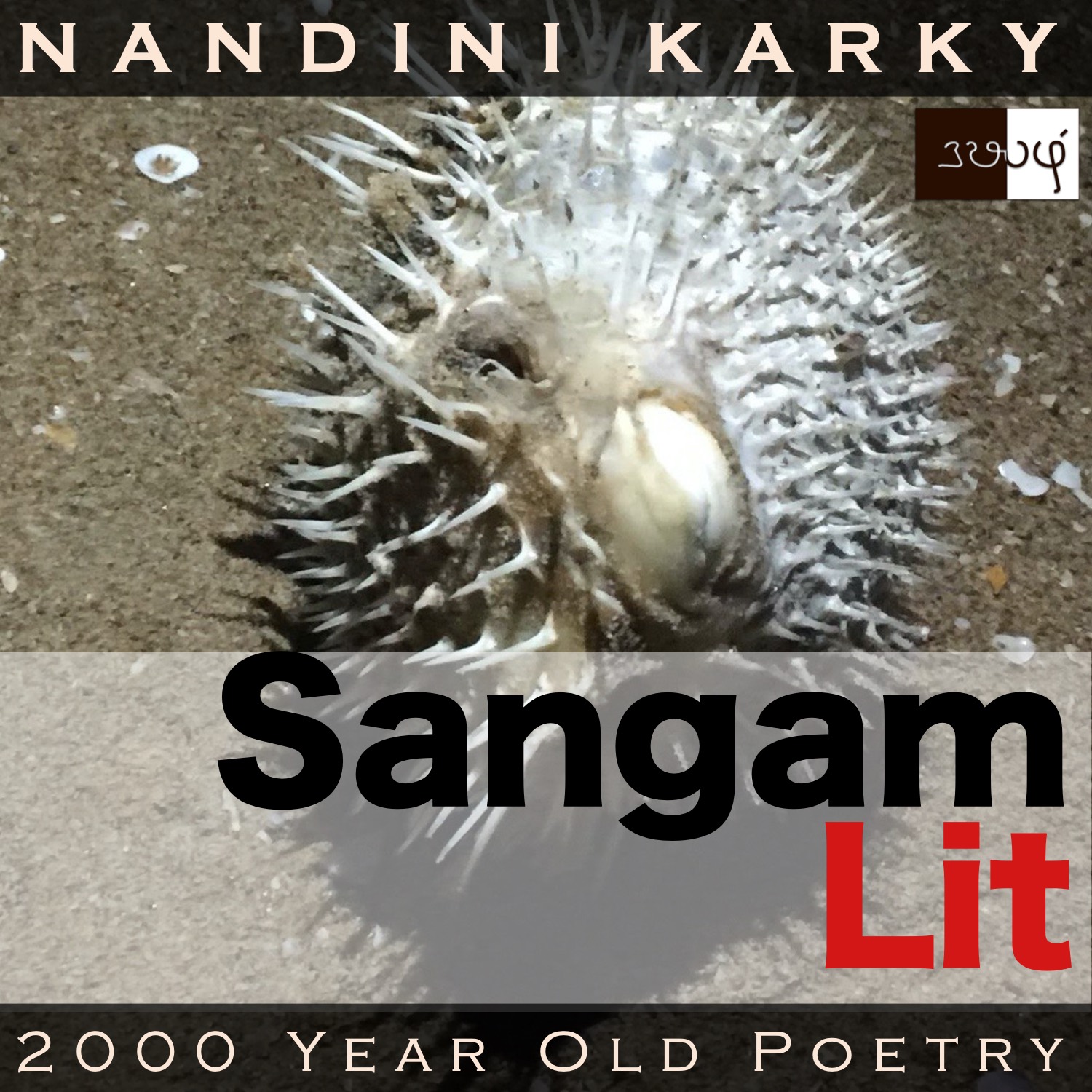Podcast: Play in new window | Download
Subscribe: Apple Podcasts | Spotify | Amazon Music | Android | iHeartRadio | TuneIn | RSS | More

In this episode, we perceive the inner and outer aspects of life in a mountain land, as portrayed in Sangam Literary work, Natrinai 285, penned by Madurai Kollan Vennaakanaar. The verse is situated in the mountain country of ‘Kurinji’ and speaks in the voice of the confidante to the lady, passing on a hidden message to the man, listening nearby.
அரவு இரை தேரும் ஆர் இருள் நடு நாள்
இரவின் வருதல் அன்றியும்-உரவுக் கணை
வன் கைக் கானவன் வெஞ் சிலை வணக்கி,
உளமிசைத் தவிர்த்த முளவுமான் ஏற்றையொடு,
மனைவாய் ஞமலி ஒருங்கு புடை ஆட,
வேட்டு வலம் படுத்த உவகையன், காட்ட
நடு காற் குரம்பைத் தன் குடிவயிற் பெயரும்
குன்ற நாடன் கேண்மை நமக்கே
நன்றால் வாழி-தோழி!-என்றும்,
அயலோர் அம்பலின் அகலான்,
பகலின் வரூஉம், எறி புனத்தானே.
The verse opens with the fear-evoking scene of ‘snakes searching for prey’ in ‘அரவு இரை தேரும்’. The phrase ‘ஆர் இருள் நடு நாள்’ depicts the ‘thick darkness of the midnight hour’. ‘வன் கைக் கானவன் வெஞ் சிலை வணக்கி’ freezes the moment when ‘an able-bodied hunter bends his formidable bow’ and when we see ‘முளவுமான் ஏற்றை’, we understand he aims at ‘a male porcupine’. The other animal that greets us here is the ‘மனைவாய் ஞமலி’ or the ‘house dog’. The word ‘உவகையன்’ compacts the descriptive phrase ‘delighted person’ into a single-word noun. ‘காட்ட நடு காற் குரம்பை’ describes ‘a hut that has been built on wooden stilts, made of forest wood’. The alliteratively exquisite ‘அயலோர் அம்பலின் அகலான்’ portrays the man as ‘he who parts not discouraged by the disparaging slander of the neighbours’. Whether that is a good thing remains to be seen! The verse ends with ‘எறி புனத்தானே’ meaning ‘to the millet fields, cleared by the burning of trees’ and details the past and present of this trysting place. Time to explore more!
The man and lady had been leading a love relationship and the man was engaged in trysting with the lady. One day, seeing him arrive by the lady’s house, the confidante, pretending not to see him, but making sure he’s listening, turns to the lady and says, “In the deep dark of midnight, when snakes roam in search of prey, he comes here. And, it’s not just at night he arrives thither. Taking powerful arrows in his capable hands, the hunter bends that fearsome bow and hits the heart of a male porcupine, making it fall. As house dogs circle around, leaping and barking, filled with the immense joy of his success, the hunter moves towards his hut, standing on sturdy wood from the forest. Such is the domain of the lord of the mountains. Will your relationship with him turn out good? May you live long, my friend! For, not dissuaded by the slander spread by our neighbours, the lord comes to the millet field, during the day too!” With these words, the confidante discourages the man from trysting with the lady by day as well as night and persuades him that the only path to pursue is to seek the lady’s hand in marriage.
Now, for the nuances! The confidante first talks about the night-time tryst and remarks with horror that the man comes to the lady’s house in the dark of the night, just the time when snakes decided to go out for a bite! Then, she adds that the man doesn’t come there only at night. Before she elaborates what other time he comes, the confidante starts to describe a scene in the lord’s mountain country, where a hunter is seen taking a firm arrow in his strong hands and then bending his imposing bow. This arrow then nails the heart of a male porcupine there. At that moment, dogs rush around, leaping and barking. That hunter is filled with joy at having succeeded at his hunt. The confidante describes that the hunter, smiling jubilantly, carries the animal to his little home in the forest. After describing this scene, the confidante wonders if the man’s relationship with the lady is doing her any good at all!
The confidante then gives a clue about why she asks this startling question. She says the man seems not to pay attention to the slanderous talk of the neighbours and keeps arriving to the daytime trysting spot too, the millet fields. Also, the confidante tells the history of how this millet field came to be. Agriculture is taking hold in the mountain country! Trees that stood tall and gave what it could to the forest’s denizens are now being razed to raise crops. Razed with the weapon called fire, to satisfy man’s desire to settle down in a spot! Returning to the verse, the confidante clarifies how the man lands up near the lady, not only during the dangerous night, but also during the troublesome day, when he falls in the eyes of neighbours, who have openly started spreading slander about the lady’s relationship with the man. This very event is what the confidante is capturing with the metaphor about dogs barking around the hunter, after his victorious hunt. The confidante describes that the only way forward for the man is to marry the lady and take her home to the delight of her kith and kin, akin to the hunter’s prize being taken home to his little hut. Although the intention or the theme of these songs seem to be the same, each setting renders some new strokes about life in this land, long ago!




Share your thoughts...